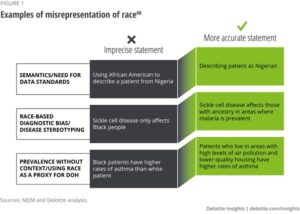
MiHIN recognized Black History Month and reflected upon what it means to support our ecosystems’ commitment to advance race equality and implement our work with an eye toward health equity.
On a systemic level, data on race and ethnicity is critical to understanding who patients are and how to improve their care, as well as identifying the root causes of health disparities. Health information exchange is critical data infrastructure to collect race and ethnicity data in order to fully understand, challenge and overcome racial inequities that persist within our society.
According to the Kaiser Family Foundation, “how we ask for, analyze, and report information on race and ethnicity affects our ability to understand the racial and ethnic composition of our nation’s population and our ability to identify and address racial disparities in health and health care. The accuracy and precision of such data has important implications for identifying needs and directing resources and efforts to address those needs.”

Progress is being made. Last month, the Office of Management and Budget (OMB) announced its proposal for updating the standards used for collecting race and ethnicity data
A Working Group made up of representatives from government agencies that collect or use race and ethnicity data presented the following recommendations:
1. Collect race and ethnicity data in a single question
The Working Group found that the separation of race and ethnicity questions is confusing to many respondents who view both race and ethnicity as similar concepts.
2. Add “Middle Eastern or North African” as a new category
The Working Group found that persons from counties in the Middle East or North Africa (MENA), who are currently in the “White” race category, do not share the same experience as persons with European ancestry who are included in this category. A MENA category would include individuals who identify with nationalities and ethnic groups with origins in countries including but not limited to Lebanon, Iran, Egypt, Syria, Morocco, and Israel.
3. Require detailed collection of race and ethnicity categories
The Working Group found that agencies collecting race and ethnicity data should collect data at a more granular level such as by country of origin.
Accurate and timely data is imperative for advancing health equity, and our ability to identify and address racial disparities within the care ecosystem hinges on our understanding of the racial and ethnic composition of our nation’s population. Updates and inputs to federal race and ethnicity reporting are an important step in the right direction.
The OMB is seeking feedback on its recommendations through a public comment process. Comments on the proposals are due by April 12, 2023.
